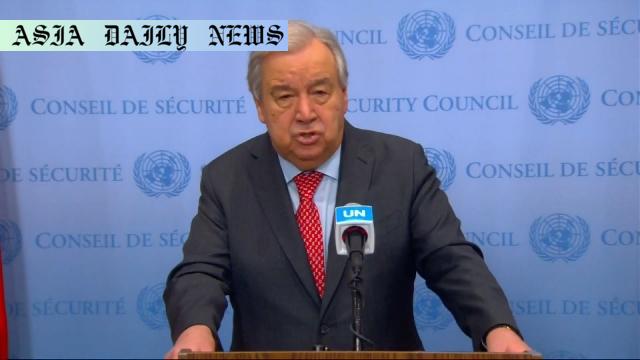Rohingya crisis: UN Secretary-General Antonio Guterres to visit world’s largest refugee settlement amid growing aid concerns.
Antonio Guterres to visit Rohingya refugee camps in Bangladesh’s Cox’s Bazar.
WFP warns of drastic food ration reductions due to lack of funds.
Nearly 1 million Rohingya refugees face growing hunger risks amid aid cutback.

Background of the Rohingya Crisis
The Rohingya crisis remains one of the most significant humanitarian challenges in the modern era. Originating from Myanmar’s Rakhine State, the crisis escalated in 2017 when a brutal military crackdown forced hundreds of thousands of Rohingya Muslims to flee to neighboring Bangladesh. Today, nearly one million refugees reside within makeshift settlements in Cox’s Bazar, which has become the world’s largest refugee camp. These refugees live in dire conditions, lacking access to adequate food, medication, and basic human rights. Despite global attention to their plight, the response from the international community has been inconsistent, often falling short of addressing the magnitude of this ongoing humanitarian tragedy.
Recent Developments in Aid and Funding
One alarming recent development concerns the reduction of food-aid budgets allocated for Rohingya refugees by the UN’s World Food Programme (WFP). Facing a shortfall of $15 million, the WFP has warned of cutting individual food assistance allocations from $12.50 per month to just $6, a drastic reduction that could lead to severe hunger and malnutrition among the refugee population. This funding gap has come to light amidst a broader context of declining international contributions, with global economic uncertainties exacerbating financial gaps in humanitarian responses. Concerns over international attention drifting away from the Rohingya crisis have further compounded the difficulties for organizations supporting these vulnerable communities.
Implications of Antonio Guterres’ Visit to Cox’s Bazar
In response to these alarming developments, UN Secretary-General Antonio Guterres has announced a scheduled visit to the Rohingya camps. His presence in Cox’s Bazar holds symbolic importance, signifying that the global leadership is aware of and concerned about the ongoing crisis. Some stakeholders believe that the visit could act as a catalyst for mobilizing more international support, addressing not only the immediate food security concerns but also prompting actionable steps for long-term solutions. Guterres’ visit will likely put a spotlight on the refugees’ plight and prompt discussions on how to ensure sustainable and adequate aid is continuously provided to the affected population.
Challenges Facing the Rohingya People
The challenges faced by the Rohingya are multifaceted. Beyond the immediate threat of hunger and malnutrition due to reduced food aid, the community also struggles with limited access to healthcare, clean water, education, and livelihood opportunities. Prolonged dependency on humanitarian assistance has further reduced their ability to achieve self-sustenance. Additionally, the looming uncertainty of repatriation to Myanmar remains a sensitive issue, as Myanmar has yet to guarantee safety, citizenship, and basic rights for returning Rohingya groups. Without international pressure, a resolution to these longstanding issues seems elusive, leaving the refugees caught in an endless cycle of displacement and deprivation.
Steps Towards a Sustainable Solution
A long-term resolution to the Rohingya crisis requires a multifaceted approach involving international cooperation, increased funding, and efforts to hold Myanmar accountable. The international community must consider expanding its financial contributions to sustain the ongoing humanitarian efforts in Cox’s Bazar. Additionally, regional and international entities should work together to negotiate safe repatriation arrangements for the Rohingya people, holding Myanmar’s government accountable for providing basic rights and protections. Lastly, integrating refugee communities into larger development frameworks within Bangladesh could provide more stable living conditions and welfare opportunities. However, this requires active participation from international donors and regional governments alike.
Conclusion
The crisis facing the Rohingya community highlights the fragility of global responses to humanitarian disasters. The uncertainty surrounding adequate funding, compounded by the broader social and political challenges faced by these individuals, serves as a sobering reminder of the importance of maintaining solidarity and compassion in humanitarian assistance. As Antonio Guterres prepares to visit Cox’s Bazar, let this moment inspire renewed action and commitment from world leaders, organizations, and stakeholders to prioritize the millions of lives hanging in the balance. The Rohingya deserve not just our sympathy but concerted and decisive action that offers them hope and a future of dignity and security.



Commentary
The Urgency of Responding to the Rohingya Crisis
The visit of the UN Secretary-General Antonio Guterres to Cox’s Bazar represents a pivotal moment in addressing the continuing plight of nearly one million displaced Rohingya refugees. By visiting the camps, Guterres is not only showing his solidarity with the refugees but also elevating the global awareness surrounding their dire living conditions amidst shrinking aid budgets. Food insecurity is a core concern, underscored by the World Food Programme’s warning about the cutbacks in food rations. This dilemma highlights the difficulties in sustaining large-scale humanitarian efforts and the need for a more robust global response.
The Role of International Cooperation
What is particularly concerning is the apparent reduction in the global focus on the Rohingya crisis. Amid various other pressing international challenges, the Rohingya community risks being relegated further to the background. This is dangerous, as it ignores the foundational causes of this crisis and the ongoing human suffering. If international stakeholders do not step in with immediate concrete measures, the consequences could be devastating for the displaced population. Widening this narrative beyond basic food aid to include discussions on human rights, citizenship for Rohingya, and accountability for Myanmar could provide lasting solutions for the community.
Taking Action Beyond Words
The time for action is long overdue. The global community has a responsibility to protect the most vulnerable populations, and the Rohingya refugees exemplify this need. Fundraising efforts, diplomatic negotiations, and policy advocacy must be prioritized to generate the support necessary for both short-term relief and long-term solutions. Guterres’ visit should not end with symbolic gestures but must catalyze swift responses from global actors. As the crisis deepens, only unified international efforts can pave the way for a brighter, more secure future for the Rohingya people.